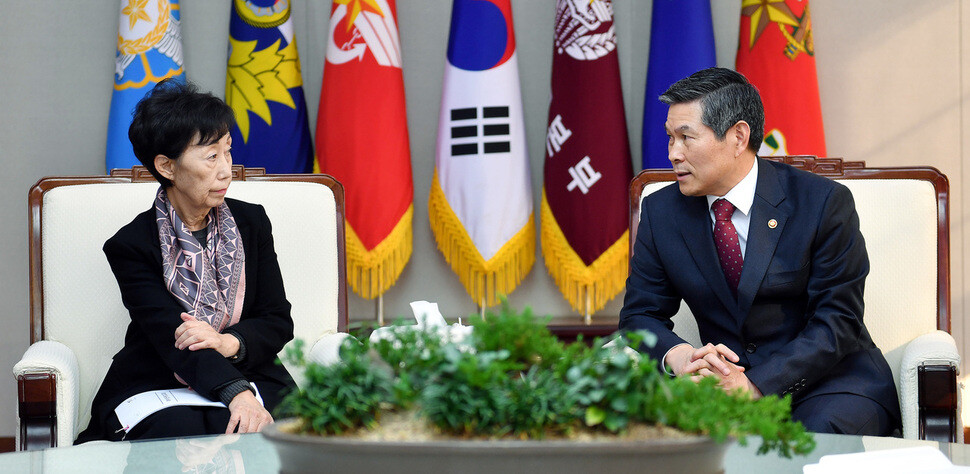hankyoreh
Links to other country sites 다른 나라 사이트 링크
NHRCK chair visits defense minister to discuss period of alternative service

Choi Yeong-ae, chair of the National Human Rights Commission of Korea (NHRCK), visited Defense Minister Jeong Kyeong-doo on Nov. 19 to express her basic disagreement with a proposed alternative to military service that the Defense Ministry is seriously considering. This alternative service would involve 36 months of work only at correctional facilities.
The meeting with Jeong took place at Choi’s request. It’s unusual for the chairperson of the NHRCK, which was established to protect human rights, to visit the Defense Minister. During a parliamentary audit at the National Assembly’s Steering Committee on Nov. 7, Choi announced her plan to tell the Defense Minister about her preferred direction for the alternative service.
During the meeting, Choi asked “that the period of alternative service be limited to one and a half the normal period of military service; that the types of alternative service be diversified beyond correctional facilities; and that a review board be established so as to guarantee fairness and independence.”
These requests are believed to basically express opposition to the main provisions of the alternative service proposal currently favored by the Defense Ministry. Civic groups and human rights organizations have raised concerns that the Defense Ministry’s proposed alternative service could devolve into a punishment for conscientious objectors and incarceration by another name.
In a recently released document, the Defense Ministry announced that it was considering a form of alternative service in which the period of service would be twice that of military service (36 months compared to 18 months in the army), the location of service would be limited to correction facilities and people performing that service would have to live at those facilities. The Defense Ministry has also been leaning toward the option of directly supervising the board that would be charged with reviewing whether applicants could perform alternative service.
Though the Defense Ministry has asserted that this is only its favored proposal and that the final decision has not been made, it has been criticized for pushing ahead without taking into account the issues raised by civic groups and human rights organizations.
The NHRCK reported that Choi “emphasized that the alternative form of service should be designed in a way that is acceptable to conscientious objectors while paying close attention to recommendations made by international human rights bodies to ensure that this does not become a punitive system.” Choi appears to have contended that if the National Assembly’s proposed form of alternative service goes beyond what is acceptable to conscientious objectors, it could violate their human rights.
The Constitutional Court previously said that “an alternative service system that is designed to be hard for even conscientious objectors to choose could serve as a form of punishment and could represent a violation of other basic rights.”
Jeong, the Defense Minister, “agreed that alternative service needs to harmonize the freedom of conscience with the responsibility to defend the nation and promised to strive toward creating a rational path of alternative service,” the Defense Ministry said.
After canvassing public opinion by holding meetings with civic groups, the Defense Ministry plans to adopt a final plan for alternative service by the end of the year and to submit a revision to the Military Service Act to the National Assembly by next February. Alternative service will take effect on Jan. 1, 2020.
By Yoo Kang-moon, senior staff writer, and Lim Jae-woo, staff reporter

Editorial・opinion
![[Column] The state is back — but is it in business? [Column] The state is back — but is it in business?](https://flexible.img.hani.co.kr/flexible/normal/500/300/imgdb/original/2024/0506/8217149564092725.jpg) [Column] The state is back — but is it in business?
[Column] The state is back — but is it in business?![[Column] Life on our Trisolaris [Column] Life on our Trisolaris](https://flexible.img.hani.co.kr/flexible/normal/500/300/imgdb/original/2024/0505/4817148682278544.jpg) [Column] Life on our Trisolaris
[Column] Life on our Trisolaris- [Editorial] Penalties for airing allegations against Korea’s first lady endanger free press
- [Editorial] Yoon must halt procurement of SM-3 interceptor missiles
- [Guest essay] Maybe Korea’s rapid population decline is an opportunity, not a crisis
- [Column] Can Yoon steer diplomacy with Russia, China back on track?
- [Column] Season 2 of special prosecutor probe may be coming to Korea soon
- [Column] Park Geun-hye déjà vu in Yoon Suk-yeol
- [Editorial] New weight of N. Korea’s nuclear threats makes dialogue all the more urgent
- [Guest essay] The real reason Korea’s new right wants to dub Rhee a founding father
Most viewed articles
- 1Amid US-China clash, Korea must remember its failures in the 19th century, advises scholar
- 2[Column] The state is back — but is it in business?
- 360% of young Koreans see no need to have kids after marriage
- 4New sex-ed guidelines forbid teaching about homosexuality
- 5Trump’s talk of flouting NATO promises sparks apprehension in Seoul
- 6[Column] Why Korea’s hard right is fated to lose
- 7[Guest essay] Maybe Korea’s rapid population decline is an opportunity, not a crisis
- 8[Reporter’s notebook] In Min’s world, she’s the artist — and NewJeans is her art
- 9Presidential office warns of veto in response to opposition passing special counsel probe act
- 10[Column] Life on our Trisolaris